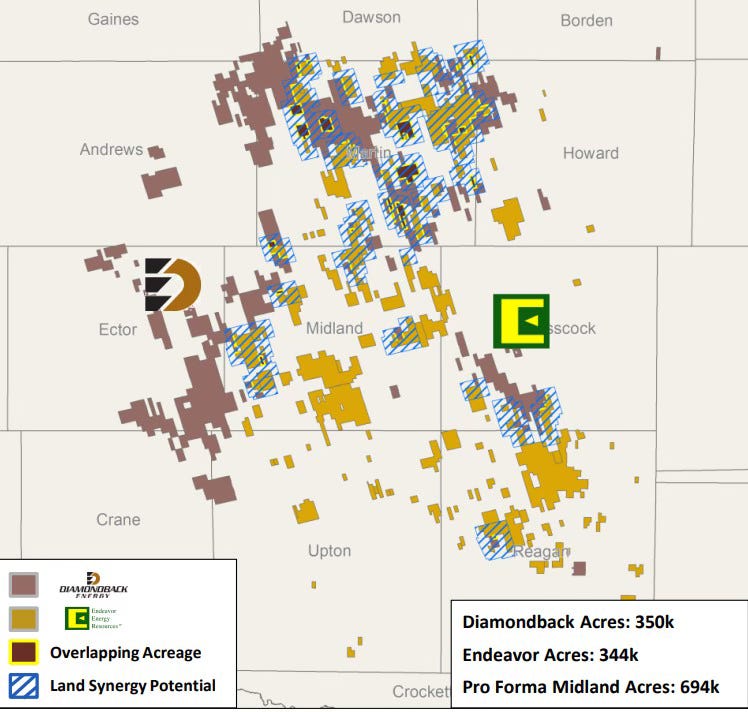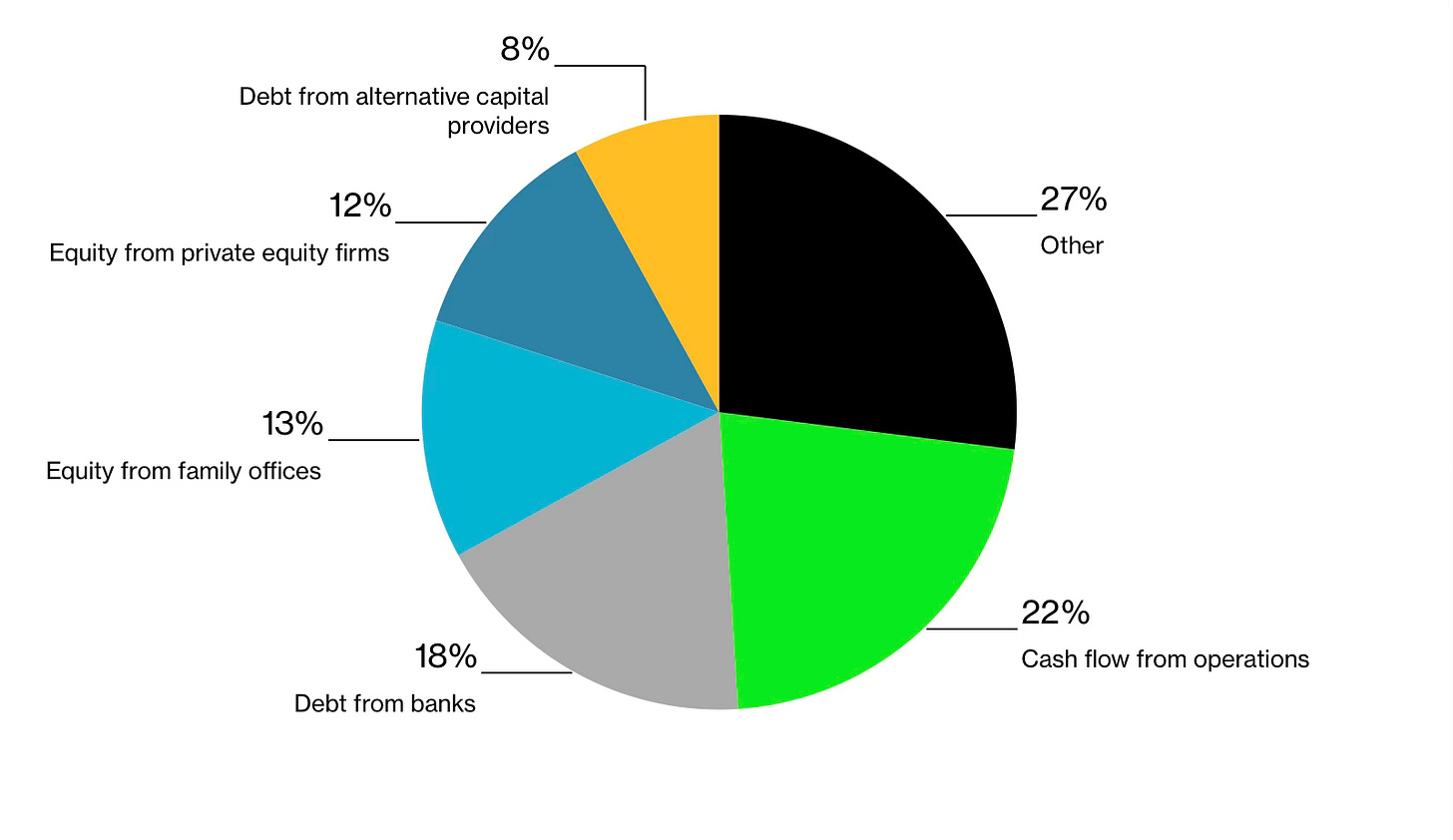Upstream Intel 9/16/24
Harris courts shale votes | Foreign deals complicated by complex regulations | The last Permian sandbox | Consolidation cost reduction
Welcome to the latest edition of Upstream Intel, Lease Analytics’ weekly roundup of our analysis and insights. As always, we would love to hear from you with news ideas, feedback and anything else you find interesting.
Sent this by a friend? Sign up here to receive UIW in your inbox every Monday.
Data Drill
Diamondback-Endeavor snakes past FTC, creating the last Permian ‘Sandbox’
Diamondback Energy's $26 billion merger with Endeavor Energy Resources has finally closed after months of intense scrutiny from the Federal Trade Commission (FTC), Hart Energy reports. While Upstream Intel has previously covered the deal both from the FTC interruption and as part of the M&A ‘supercycle’, the merger’s finalization also marks the next stage of the Permian.
The consolidation represents what analysts are calling "the last and best oil sandbox" in the basin. Over approximately 838,000 net acres, the combined entity’s land offers unparalleled opportunities for focused technological application and production efficiencies.
Diamondback paid approximately $31,200 per acre and $4.7 million per drilling location. In turn, Diamondback has secured its future as the largest privately held pure-play operator in the Midland Basin. Now it has the complex task of turning its geographic sandbox into an operational one, integrating over 2,300 new drilling locations without losing track of assets.
Downsides of consolidation come into focus as jobs, pay, and payouts fall
While upstream has seen a remarkable nearly 2-year run of M&A activity, the party is winding down. While overall activity figures are likely to be residually elevated, PE-packed rollups and small non-core acquisitions of divested assets are far from the massive acquisitions that have characterized the last 18 months. In the last act of the one of the largest industry shakeups this century, the darker sides of consolidation are now coming into focus.
As “synergies” move from rhetoric to reality, combined entities are shedding jobs as they seek to reduce debt and wow investors with leaner G&A expenses. According to the latest Labor Department report, the number of front-line oil and gas workers fell by 1.2% month-over-month, to 118,400 in August, marking the lowest level this year. Simultaneously, the industry's unemployment rate has risen a full 1%, and average hourly earnings have dropped by nearly 3% in what is an otherwise buoyant labor market.
Especially as oversupply concerns have forced crude below $75 per barrel, lean times appear ahead. Yet oftentimes in their rush to reduce costs and impress Wall Street, operators end up cutting muscle along with fat, sowing the seeds for tomorrow’s operational crises. The “great resignation” may be behind us, but key talent is still harder to keep than pre-pandemic, and the business of turning purchases into production will require elevated spending on certain areas if producers don't want M&A to turn into the major misses that dot corporate history.
Harris prospects hinge on Pennsylvania shale industry
As the US election cycle hits its fever pitch, winning the election has becoming a game of shale support. As UIW previously reported, Vice President Kamala Harris walked back previous anti-fracking positions, going as far as to brag about record US oil production - which has happened largely in spite of Biden administration policy rather than because of it.
The shift is as drastic as it is necessary. While Harris has performed well in polls in recent weeks, electoral college calculus makes Pennsylvania a key step in the path to the White House. Sitting on 2/3rds of the Marcellus shale, shale production plays a pivotal part in the state’s economy, creating 93,000 direct natural gas and oil jobs, and over 330,000 indirect jobs.
The political debate over fracking isn't really about the process of shoving water, sand and chemicals down a pipe at extremely high pressure to crack open rock and release oil and gas. The issue of a ban is really more of a symbolic statement.
— Kevin Book, ClearView Energy Partners
Borrowing from Joe Manchin’s playbook, Harris’ energy policy increasingly looks like an "all-of-the-above" strategy on promoting energy source. While such support might be superficial, it bears noting that doom and gloom through the electoral cycle has little direct effect on the oil sector beyond sentiment and regulatory philosophy. The president cannot ban fracking or do much of anything without congress, which is likely to be just as dysfunctional after inauguration has before.
Increasing oversight complicates foreign land purchases
The ongoing legal dispute between Chinese-owned GH America Energy and the Texas power grid operator ERCOT over land purchases has brought the complex, and increasingly conflicting, landscape of foreign investment regulations to light. Despite the Committee on Foreign Investment in the United States (CFIUS) - the US investment oversight body - approving the deal, Texas regulators have blocked it under the Texas Lone Star Infrastructure Protection Act which is one of a rising number of laws directly challenging the primacy of federal oversight mechanisms.
At the federal level, CFIUS plays a crucial role in reviewing foreign investments for national security concerns. The committee, comprised of representatives from various federal agencies, has the authority to investigate transactions that could result in foreign control of US businesses or critical infrastructure. In recent years, CFIUS has intensified its scrutiny of Chinese investments, often requiring mitigation measures or blocking deals outright. This process, while comprehensive, can be time-consuming and unpredictable, creating increasing uncertainty for foreign investors as the recent Nippon-US steel saga brings the process into view.
Simultaneously, individual states have been implementing their own restrictions on foreign land purchases, particularly targeting Chinese buyers. Texas' Lone Star Infrastructure Protection Act is just one example of state-level legislation aimed at limiting foreign access to critical infrastructure. Other states have enacted similar measures, ranging from outright bans on land purchases by foreign entities to enhanced reporting requirements.
This patchwork of state regulations, coupled with the federal CFIUS process, has anecdotally changed the calculus of investment in the US for foreign companies, especially in sectors perceived to be associated with natural security like land, technology, energy, and manufacturing.
In Other News
Bespoke capital landscape offers US producers an advantageous environment relative to global peers
While the ESG movement is in full retreat and banks are lending to fossil fuel projects again, the US oil patch is making sure it’s not vulnerable to a single funding source. Compared to pre-pandemic operations, oil and gas companies are raising funds from diversified group of sources, as well as relying more on free cashflow than pre-pandemic. This capital balance ensures that the sector will be ready for resurgence of premature underinvestment in E&Ps.
Read more in EnergyNow.
New Mexico explores using produced water to alleviate droughts
Abundant produced water in the New Mexican Permian may help state officials deal with a severe drought. State officials have pursued pilots which treat byproduct of drilling operations to create usable water for agriculture and industry while helping deal with the growing wastewater disposal problem.
While the treatment costs are far above that of normal industrial or agricultural water, the cost-benefit picture may shift as water resources struggle under the rapid development of northern Texas and oil majors look for ways to address the wave of wastewater from their operations.
Read more in Reuters.
BP leverage spy tech provider to upgrade operations
BP signed a new five-year strategic agreement with Palantir Technologies, a secretive government analytics contractor, to develop the company’s generative AI platform. The partnership seeks to develop a data analysis tool that will suggest actions based on automated data analysis across global operations.
Previous work with the Peter Thiel-backed company have been instrumental in BP's digital transformation program, optimizing production systems through the creation of a model-based digital twin that integrates real-time data from over two million sensors.
Read more in Offshore Technology.
Improving US gas outlook diverges with declining global demand
Natural gas has been a headache for producers throughout the unexpectedly mild summer. And the combination of rising investment in production, midream limitations, and throttled downstream demand make it easy to take a pessimistic approach.
Yet the combination of flared gas monetization, surging consumption across power generation, industrial processes, and LNG exports is set to boost gas prices 44% above 2024 averages according to futures markets. On the contrary, Europe - which had driven record US LNG exports for the last several years - is experiencing stagnant economic activity and falling energy demand.
Read more in Reuters.
Quote of the Week:
New details emerged this week about the Department of Interior royalty gap which found that “DOI’s tracking system was so defective that employees had to rely on paper records to keep track of oil and gas activities.”
“The program that DOI bought to track records cost $40 million to put together and has burned through $19 million in lost productivity because it is so time consuming to use,” according to the GAO report.
What We’re Reading
Diamondback’s Viper Buys $1.1B in Permian Mineral, Royalty Interests. (Hart Energy)
APA to divest non-core assets in Permian Basin for $950m. (Offshore Technology)
Trillions of Dollars of Fossil Fuel Finance Routed via Tax Havens, Study Says. (Reuters)
The Tennessee Valley Authority comes under fire for building gas plants instead of renewables amid rising electricity needs. (Washington Post)
EIA expects spike in oil prices despite concerns over economic growth. (Offshore Technology)
OPEC+ policy dilemma prompts “confused message” amid increased U.S. shale production. (Bloomberg)
Texas Biz Court Will Be A Brave New World For Energy Cos. (Law360)
Judge blocks Interior methane rule in five states: The order halts the Biden administration’s new limits on venting and flaring in oil fields in North Dakota, Wyoming, Texas, Montana and Utah. (Politico)






